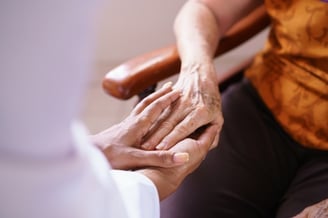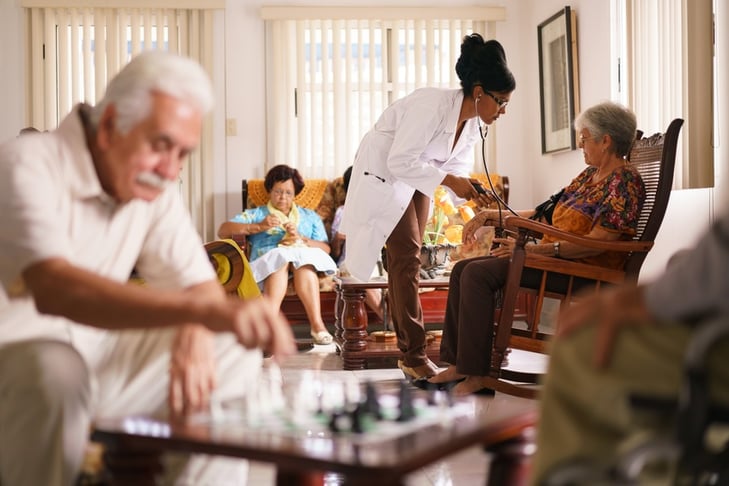Seniors face a more significant risk of serious injuries or major illnesses than younger adults — that’s just a natural part of aging. As we become older, our bodies become weaker and more frail. No matter in what excellent shape we keep ourselves, eventually time catches up.That means that seniors are also more likely, at some point in their lives, to be hospitalized and to thereafter need a short-term physical or occupational rehab stay in a skilled nursing facility.
Short-term rehab facilities, like Episcopal Retirement Services’ Marjorie P. Lee Retirement Community in Hyde Park, serve a variety of needs that your senior loved one may eventually encounter.
Unfortunately, those needs can crop up without any warning whatsoever. And many families encounter them without first having a care plan in place, or without even having discussed a provider preference.
That often leaves caregivers in the difficult position of having to make choices for their senior loved ones — and of figuring out means of paying for inpatient rehab care.  But families that have discussions about care preferences, and that plan ahead for the expenses, are one step ahead.
But families that have discussions about care preferences, and that plan ahead for the expenses, are one step ahead.
Starting care discussions can be difficult, especially if an aging parent is still healthy and is resistant to talking about future health needs. It’s best to start the conversation with an idea of what your parent could face in the future.
To that end, here are four reasons why your elderly parent might need a short-term rehab stay. We don’t mention them to frighten you — only to raise your awareness and help you to plan ahead.
1. Stroke recovery
Strokes, or cerebrovascular accidents (CVAs), are serious intracranial bleeding events that deprive brain tissues of blood and oxygen, causing brain cells to die. In the United States, they’re the leading cause of long-term disability.
Strokes can be caused by blood clots forming anywhere in the body, coming loose, travelling to and lodging in the brain’s vessels, where they block blood flow. They can be caused by tears developing in already weakened blood vessel walls (aneurysms). They can be caused by chronic high blood pressure. And they can be caused by direct head trauma.
Many stroke patients lose the ability — temporarily, sometimes permanently — to move one or more limbs, to walk, see, hear, talk, remember faces and names, or even perform the tasks of daily living.
Survivors of moderate to large strokes often need an extensive period of convalescence to recover their abilities. Sometimes, brain function in the affected area never returns and permanent placement becomes necessary.
Sometimes, brain function comes back (to varying degrees) only after a lot of physical and occupational therapy in an inpatient setting. Short-term rehab facilities are often the first waypoint after the hospital on a stroke patient’s long road home.
2. Fall injury recovery
Falls are one of the leading risks to life and limb in aging Americans. Fully one-third of seniors in the United States are treated for fall-related injuries every year.
Falls can result in serious head traumas that cause strokes. Falls can also be caused by strokes. They can be caused by trips and falls associated with the natural reduction in mobility that many seniors develop as they age. They can also be caused by taking certain medications, or by polypharmacy (taking multiple medications or supplements on a regular basis), as many seniors do.
They can also be caused by pure, dumb luck. Falls can happen to anyone at any time — even the healthiest aging parent can trip over a pet or a grandchild, take the wrong step on a flight of stairs, or stumble into a piece of furniture on his way to use the bathroom at 3 a.m.
Short-term rehab facilities often treat people who face a long recovery period after a serious fall-related injury.
3. Wound care
Short-term rehab facilities provide care for patients who have non-healing or slow-to-heal wounds.
Diabetic older parents, in particular, may need short-term inpatient wound care at some point, because their conditions cause blood vessels to harden and constrict — especially in extremities like the hands and feet. That loss of blood flow reduces healing and infection-fighting ability. Even small scrapes or cuts can quickly become serious, hard-to-manage open wounds.
Post-surgical wounds also sometimes require inpatient wound care. That’s particularly true if an aging parent isn’t very mobile and the wound is in an area that is hard to reach and dress, such as the buttocks, the back, or a foot.
4. Elective surgeries
Maybe your mom or dad is, overall, pretty healthy. But what about that nagging knee problem that makes walking painful? Or that ruptured disk in his or her lower back? What if he or she needs a hip replacement?
Short-term rehab facilities treat people who are recovering from elective joint replacement surgeries, spinal fusion procedures and more. Many joint replacement surgery patients can get by with outpatient physical therapy, but some patients (especially older patients) may require an inpatient setting for rehab care.
This is especially true for aging parents who live alone, for whom it may not be safe to remain alone while recovering, or whose conditions require a more extensive rehab regimen than could be completed on an outpatient basis.
Be prepared when your loved one needs short-term rehab care!
Many families that find themselves unexpectedly needing to choose a short-term rehab facility mistakenly think that they’ll get a lot of guidance from hospital nurses or social workers in making those decisions. But the truth is, they won’t. Often, they’ll just be handed a list of providers and told to make a choice just before discharge.
The best defense against that? Research short-term rehab facilities in your area — before your aging parent needs on.














